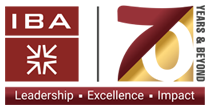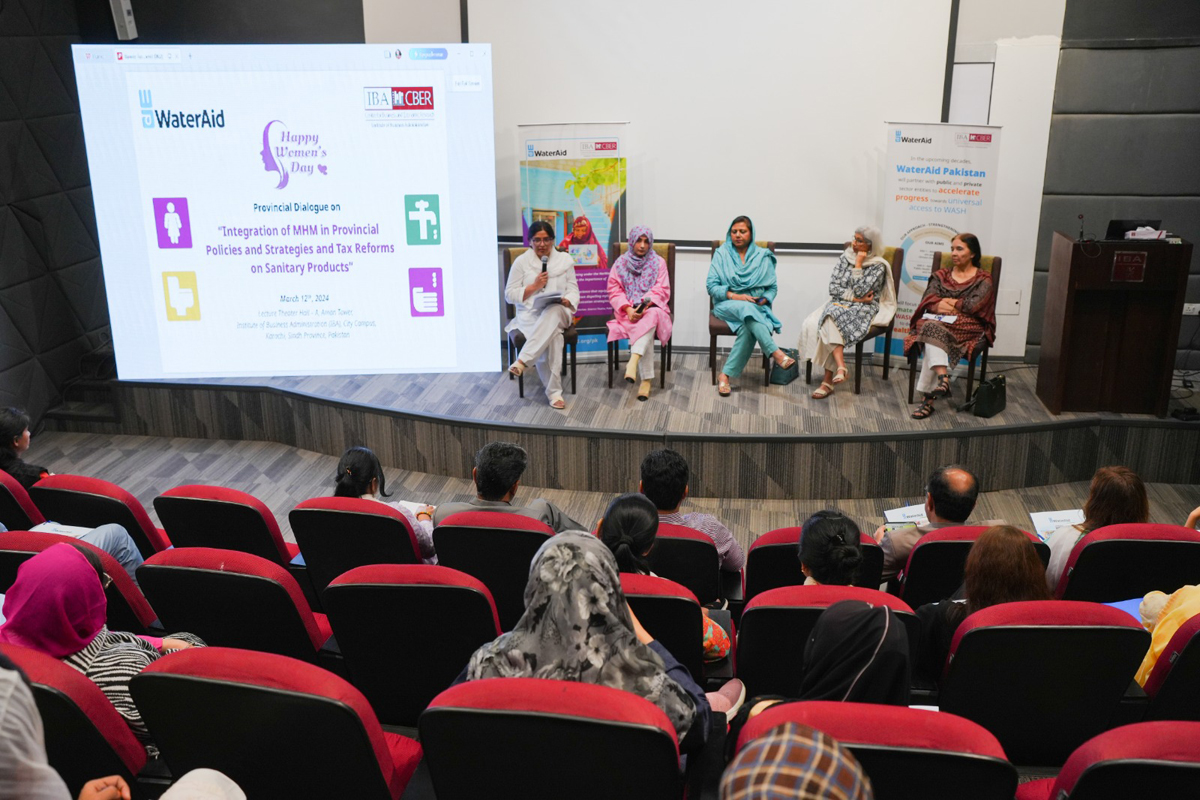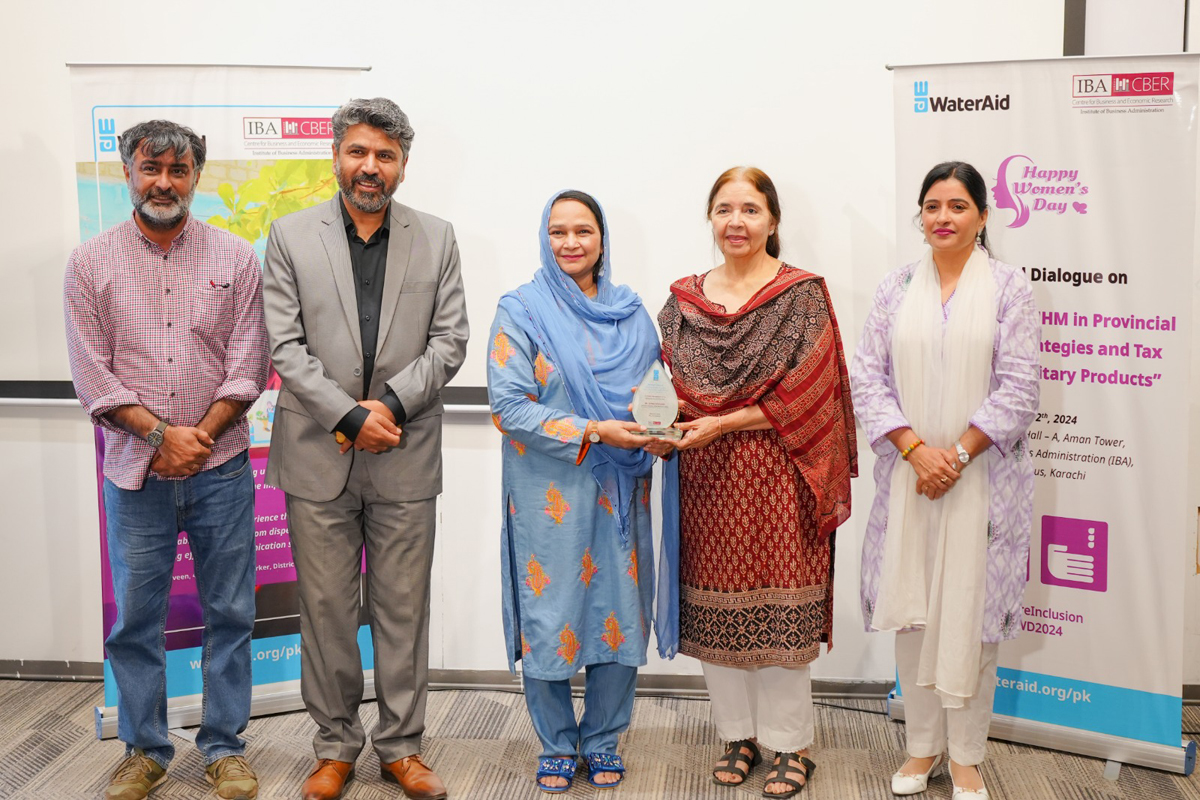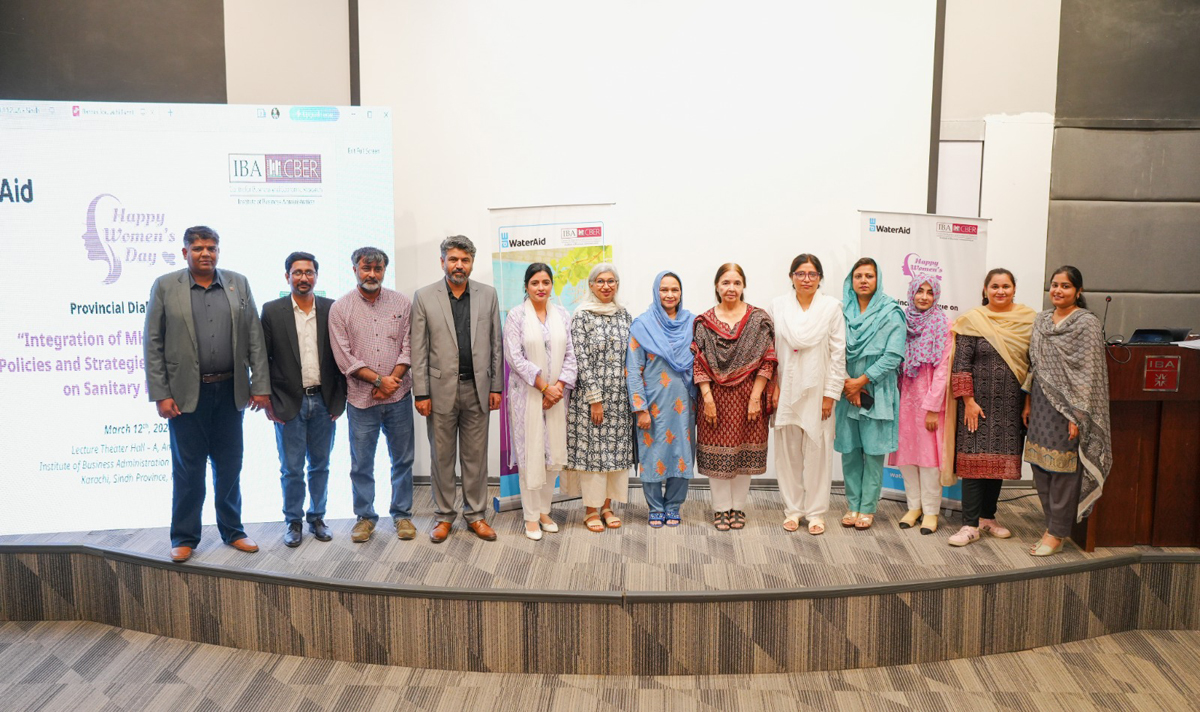IBA Karachi and Water Aid Pakistan organize a provincial dialogue on ‘Integration of MHM in Provincial Policies and Strategies and Tax Reforms on Sanitary Products’
March 12, 2024: Center for Business and Economic Research (CBER), Institute of Business Administration (IBA) Karachi, in collaboration with Water Aid Pakistan unveiled its Provincial Dialogue on ‘Integration of MHM in Provincial Policies and Strategies and Tax Reforms on Sanitary Products’ at the IBA City Campus. The event witnessed influential voices discussing policies, strategies and tax reforms on sanitary products. Master of the ceremony, Madu Malla introduced the agenda for the insightful event.
Muhammad Khaliq, Provincial Manager, Water Aid Pakistan extended a warm welcome to the participants, focusing on the integration of Menstrual Hygiene Management (MHM) into provincial policies and strategies, alongside discussions on tax reforms concerning sanitary products. The event shed light on the organization's impactful work, particularly in regions including Thatta, Malir, and other marginalized areas across the nation. Mr. Khaliq underscored Water Aid's unwavering commitment to providing vital support and dedication to integrating MHM into provincial policies and strategies. He emphasized the importance of this integration in ensuring the well-being and dignity of women and girls across the province.
Raheema Panhwar, Gender Advisor at WaterAid Pakistan, presented critical insights on the gap analysis of MHM and tax reforms. Ms. Panhwar highlighted the challenges within governmental policies at both provincial and national levels, emphasizing the need for comprehensive revisions to address MHM needs effectively. She underscored the importance of addressing issues of dignity and stigmatization along with MHM service provision.
The presentation emphasized the significance of international commitments, including the Sustainable Development Goals (SDGs), in driving the policy revision process and integrating MHM into provincial mandates.
Dr. Lubna Naz, Director CBER-IBA conducted a panel discussion. She emphasized the significance of understanding menstrual cycle at various points of reproductive age among women, creating awareness about menstrual hygiene using institutional support, and issues with affordability and sustainability of MHM in Pakistan. Distinguished panelists included Sadiqa Sallahuddin, Executive Director, Indus Resource Centre; Zofeen T. Ebrahim, Freelance Journalist; Dr. Naima Shaikh, Additional Director, RMNCH, Health Department, Government of Sindh; and Paras Shahab Memon, Assistant Commissioner, Regional Tax Office/Federal Board of Revenue (FBR).
Ms. Sallahuddin emphasized the necessity of incorporating MHM into educational curricula and ensuring the availability of girlfriendly washrooms in schools. She advocated for the nationwide implementation of comprehensive MHM educational policies, stressing the importance of inclusivity in project design to benefit vulnerable groups. Ms. Ebrahim highlighted the evolving discourse around menstrual hygiene in the media and emphasized the need for open discussions on national platforms to challenge stereotypes. She underscored the nexus between Water, Sanitation, and Hygiene (WASH), climate change, and vulnerable groups, urging policy implementation and public-private initiatives. Emphasizing the importance of awareness campaigns, Dr. Shaikh underscored the critical role of clean water in preventing health complications associated with unhygienic menstrual practices. While, Ms. Memon, highlighted international pressure affecting tax policies and advocated for duty-free access to essential menstrual products.
Concluding remarks were given by Rana Ansar, Member of the National Assembly. She emphasized the critical need for comprehensive strategies and political will to address societal issues effectively. She acknowledged the valuable contribution of Water Aid in addressing pressing societal issues, particularly in the realm of menstrual hygiene management. Ms. Ansar stressed the imperative of efficient policy implementation to ensure equitable access to essential services. She reiterated the importance of collective efforts from both governmental and non-governmental sectors to drive positive change and create a more inclusive and progressive society.
Dr. Abdul Haq Chang, Assistant Professor of Anthropology, Department of Social Sciences and Liberal Arts, SESS, IBA Karachi, delivered a vote of thanks, expressing his gratitude to the attendees for their active participation. He particularly acknowledged the youth, including the students from IBA Karachi, for their enthusiastic involvement in discussions concerning vital societal issues like MHM. He also highlighted the importance of youth involvement in breaking barriers and driving positive change towards fostering a more inclusive and progressive society.



